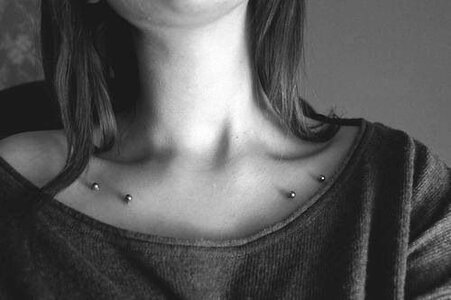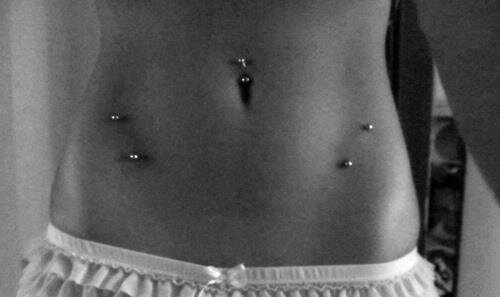TL;DR alert.
Those specific piercings are kind of shielded by protruding bones and thus bumping is not that big of an issue. Catching it on your clothes on the other hand - very frequent. The truth is there is no piercing that won't be endangered to contact with clothes or accidental touching or pulling. It does not affect healing process that much, but you have to be careful, especially until piercing is completely healed.
This kind of piercing is more often done with surface bars than with microdermals, there are pros and cons to both of them. From what I know surface bars heal longer, but if you decide to remove them you just pull the bar out and that's it. Healed microdermals are more complicated to remove as the base of the piercing is overgrown with flesh and they usually have to be scalpelled out. Bar is more likely to migrate (change it's position) especially if it's not done deep enough or the diameter of jewellery is too small.
When choosing a piercer there are several things that you should check:
1. AUTOCLAVE.
What autoclave does is deeply sterilize equipment and jewellery using high pressure steam. The equipment and jewellery is inserted into special package that seals itself during the cleaning process and remains sterile until opened. The package may look like that:
Piercing salon MUST have autoclave, if they don't - run away. You can contract so many diseases (even HIV) while using non-sterile equipment that it's scary to even think about it. What should be sterilised using autoclave are tools like tongs that don't break your skin but are used near the wound and jewellery that is inserted into fresh canal. Piercer should open the packages just before using them, if you come to studio and see them already open never believe that they were just opened, request new, unopened ones. Autoclave process lasts 20 minutes, don't let them tell you that it's any longer and feel pressured into using already opened equipment.
2. STERILE SINGLE-USE NEEDLES
Needles cannot be used more than once, they cannot be sterilised in autoclave (due to material they are made of). That's all there is to it. Piercer should open new needle in your presence after cleaning pierced area with alcohol and putting on new, sterile gloves. Only then it is safe to proceed with sticking that needle into your body.
3. GLOVES
Piercer should have two pairs of gloves. First pair is regular, latex or vinyl, and it's used to prepare the piercing station, do the preliminary cleaning of the pierced area on your body and also to clean up after everything is done. Second gloves are special sterile gloves taken out of fresh, just opened package and used only to touch your skin, the needle and the jewellery.
4. JEWELLERY
Jewellery that is inserted into fresh canal shoul be titanium. Surgical steel 316L is also acceptable, but titanium is far better - it's a lot more biocompatible and does not containg nickel. Steel can sometimes cause allergic reaction. It also is better as far as the healing process goes.
Jewellery that is inserted into the fresh canal is usually longer than it will be in the healed one - that's because body can and usually will swell when you pierce it and the swelling will usually last for 1-3 weeks depending on what you pierced.
5. JEWELLERY CHANGE AFTER HEALING PERIOD
Most good piercers will ask you to come back in x weeks to check how your piercing is healing and also to change the jewellery you're wearing to a more suitable size.
6. AFTERCARE AND HYGIENE
Good piercer should instruct you as to how you are to care about your new shiny piercing. However, if he tells you to use alcohol or peroxide, RUN. He doesn't know shit about human body and you better find someone else.
Choosing good piercer is
EXTREMELY important and I can't sress this out enough. You can always go to the place that you are thinking of choosing and ask them about their equipment and their autoclave machine, ask them exactly how the piercing process looks, ask about jewellery materials, price, whether you get free replacement jewellery once healed and anything you may want to know. If piercer seems uneasy about your questions or is reluctant to show you equipment - don't choose him. It could be that you are lucky and getting pierced by him will do no damage, but it also could be that you will encounter severe health complications and it's simply not worth it. If the price is suspiciously low - don't do it. They could just pretend to use good materials while in reality using something shitty that won't help you in healing. Some very good studios however will sometimes have 50% (on any other amount) off offers on certain piercings and I suggest you wait for such an event especially if the price is a factor for you.
I agree 100% with extreme hygiene regimen when it comes to piercing, I have several (septum, double tongue, industrial, helix etc) and I have
never had problem with healing, but I am very specific about cleaning my piercings. Fresh piercing should be cleaned with sterile gauze and Octenisept 3 times a day, not more, not less, and here's why: Less than 3 times a day causes bad bacteria and filth to accumulate and it can cause infections. More than 3 times a day destroys your body healing attempts and will elongate healing process (also can cause infections). You should avoid any contact with fresh piercing. DO. NOT. FUCKING. TOUCH IT. If you absolutely HAVE TO touch it - wash your hands very thoroughly. I know it may seem a bit orthodox, but it gives you the best chance of healing your piercing without any complications and living with it happily ever after.
I hope I answered some of the question you might have had. I have a lot of experience with the topic and if you want to know anything else please feel free to ask






